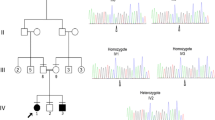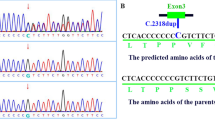Abstract
KDM3B is located on chromosome 5q31 and encodes KDM3B, which is involved in histone demethylation and epigenetic regulation. Pathogenic KDM3B variants cause a dominantly inherited disorder presenting with intellectual disability (ID), short stature, and facial dysmorphism, named Diets–Jongmans syndrome. We describe two patients with KDM3B variants presenting with Diets–Jongmans syndrome. Genetic testing was performed because of the clinical data and a lack of a clear diagnosis in both patients. Candidate variants were verified by Sanger sequencing. After KDM3B variants were detected, in silico tools were used to predict the pathogenicity of the missense variants. A minigene assay was performed to evaluate the splicing effects of the c.5070 + 1G > A variant on KDM3B. Patient 1 mainly presented with repetitive upper respiratory tract infection and patient 2 presented with palpitation, shortness of breath, and pitting edema; both had ID. Whole exome sequencing identified variants of KDM3B. Patient 1 had the de novo KDM3B c.5070 + 1G > A variant, whereas patient 2 had the c.2828G > A (p.R943Q) variant. Transcriptional experiments of the splicing variant c.5070 + 1G > A revealed aberrant transcripts leading to truncated protein products. We found two pathogenic variants in KDM3B, one of which is novel. Both patients had additional clinical presentations, and patient 1 had transient neutropenia. KDM3B c.5070 + 1G > A is the first KDM3B splice-site variant and was identified as a germline variant. Neutropenia and cardiomyopathy are newly found presentations of Diets–Jongmans syndrome. Our report enriches our knowledge of the genotypic spectrum of the KDM3B variants and phenotypic diversity of Diets–Jongmans syndrome.



Similar content being viewed by others
Data Availability
The KDM3B variant c.5070+1G>A has been submitted to the ClinVar database (http://www.ncbi.nlm.nih.gov/clinvar, accession numbers: SCV002822845).
References
Lai F, Godley LA, Fernald AA, Orelli BJ, Pamintuan L, Zhao N, Le Beau MM (2000) cDNA cloning and genomic structure of three genes localized to human chromosome band 5q31 encoding potential nuclear proteins. Genomics 70:123–130. https://doi.org/10.1006/geno.2000.6345
Diets IJ, van der Donk R, Baltrunaite K, Waanders E, Reijnders MRF, Dingemans AJM, Pfundt R, Vult-van Silfhout AT, Wiel L, Gilissen C, Thevenon J, Perrin L, Afenjar A, Nava C, Keren B, Bartz S, Peri B, Beunders G, Verbeek N, van Gassen K, Thiffault I, Cadieux-Dion M, Huerta-Saenz L, Wagner M, Konstantopoulou V, Vodopiutz J, Griese M, Boel A, Callewaert B, Brunner HG, Kleefstra T, Hoogerbrugge N, de Vries BBA, Hwa V, Dauber A, Hehir-Kwa JY, Kuiper RP, Jongmans MCJ (2019) De novo and inherited pathogenic variants in KDM3B cause intellectual disability, short stature, and facial dysmorphism. Am J Hum Genet 104:758–766. https://doi.org/10.1016/j.ajhg.2019.02.023
Sui Y, Gu R, Janknecht R (2021) Crucial functions of the JMJD1/KDM3 epigenetic regulators in cancer. Mol Cancer Res 19:3–13. https://doi.org/10.1158/1541-7786.mcr-20-0404
Li S, Ali S, Duan X, Liu S, Du J, Liu C, Dai H, Zhou M, Zhou L, Yang L, Chu P, Li L, Bhatia R, Schones DE, Wu X, Xu H, Hua Y, Guo Z, Yang Y, Zheng L, Shen B (2018) JMJD1B demethylates H4R3me2s and H3K9me2 to facilitate gene expression for development of hematopoietic stem and progenitor cells. Cell Rep 23:389–403. https://doi.org/10.1016/j.celrep.2018.03.051
Saavedra F, Gurard-Levin ZA, Rojas-Villalobos C, Vassias I, Quatrini R, Almouzni G, Loyola A (2020) JMJD1B, a novel player in histone H3 and H4 processing to ensure genome stability. Epigenetics Chromatin 13:6. https://doi.org/10.1186/s13072-020-00331-1
Guipponi M, Santoni FA, Setola V, Gehrig C, Rotharmel M, Cuenca M, Guillin O, Dikeos D, Georgantopoulos G, Papadimitriou G, Curtis L, Méary A, Schürhoff F, Jamain S, Avramapoulos D, Leboyer M, Rujescu D, Pulver A, Campion D, Siderovski DP, Antonarakis SE (2014) Exome sequencing in 53 sporadic cases of schizophrenia identifies 18 putative candidate genes. PLoS One 9:e112745. https://doi.org/10.1371/journal.pone.0112745 Erratum in: PLoS One 10:e0141630. https://doi.org/10.1371/journal.pone.0141630
Zhu N, Gonzaga-Jauregui C, Welch CL, Ma L, Qi H, King AK, Krishnan U, Rosenzweig EB, Ivy DD, Austin ED, Hamid R, Nichols WC, Pauciulo MW, Lutz KA, Sawle A, Reid JG, Overton JD, Baras A, Dewey F, Shen Y, Chung WK (2018) Exome sequencing in children with pulmonary arterial hypertension demonstrates differences compared with adults. Circ Genom Precis Med 11:e001887. https://doi.org/10.1161/circgen.117.001887
Mahamdallie S, Yost S, Poyastro-Pearson E, Holt E, Zachariou A, Seal S, Elliott A, Clarke M, Warren-Perry M, Hanks S, Anderson J, Bomken S, Cole T, Farah R, Furtwaengler R, Glaser A, Grundy R, Hayden J, Lowis S, Millot F, Nicholson J, Ronghe M, Skeen J, Williams D, Yeomanson D, Ruark E, Rahman N (2019) Identification of new Wilms tumour predisposition genes: an exome sequencing study. Lancet Child Adolesc Health 3:322–331. https://doi.org/10.1016/s2352-4642(19)30018-5
Tabaku M, Tomori S, Cullufi P, Dervishi E, Paknia O, Bauer P (2022) A novel de novo pathogenic variant in KDM3B gene at the first Albanian case of Diets-Jongmans syndrome: DIJOS. Mol Genet Metab Rep 33:100927. https://doi.org/10.1016/j.ymgmr.2022.100927
Faundes V, Newman WG, Bernardini L, Canham N, Clayton-Smith J, Dallapiccola B, Davies SJ, Demos MK, Goldman A, Gill H, Horton R, Kerr B, Kumar D, Lehman A, McKee S, Morton J, Parker MJ, Rankin J, Robertson L, Temple IK, Clinical Assessment of the Utility of Sequencing and Evaluation as a Service (CAUSES) Study, Deciphering Developmental Disorders (DDD) Study, Banka S (2018) Histone lysine methylases and demethylases in the landscape of human developmental disorders. Am J Hum Genet 102:175–187. https://doi.org/10.1016/j.ajhg.2017.11.013
Liu Z, Chen X, Zhou S, Liao L, Jiang R, Xu J (2015) The histone H3K9 demethylase Kdm3b is required for somatic growth and female reproductive function. Int J Biol Sci 11:494–507. https://doi.org/10.7150/ijbs.11849
Kim YG, Bak MS, Kim A, Kim Y, Chae Y-C, Kim YL, Chun Y-S, An J-Y, Seo S-B, Kim SJ, Lee Y-S (2021) Kdm3b haploinsufficiency impairs the consolidation of cerebellum-dependent motor memory in mice. Mol Brain 14:106. https://doi.org/10.1186/s13041-021-00815-5
Jaenisch R, Bird A (2003) Epigenetic regulation of gene expression: how the genome integrates intrinsic and environmental signals. Nat Genet 33:245–254. https://doi.org/10.1038/ng1089
Author information
Authors and Affiliations
Corresponding author
Additional information
Publisher's note
Springer Nature remains neutral with regard to jurisdictional claims in published maps and institutional affiliations.
Rights and permissions
Springer Nature or its licensor (e.g. a society or other partner) holds exclusive rights to this article under a publishing agreement with the author(s) or other rightsholder(s); author self-archiving of the accepted manuscript version of this article is solely governed by the terms of such publishing agreement and applicable law.
About this article
Cite this article
Zhao, X., Yu, T., Tang, J. et al. Two patients with KDM3B variants and new presentations of Diets–Jongmans syndrome. Neurogenetics 24, 95–101 (2023). https://doi.org/10.1007/s10048-023-00711-1
Received:
Accepted:
Published:
Issue Date:
DOI: https://doi.org/10.1007/s10048-023-00711-1




